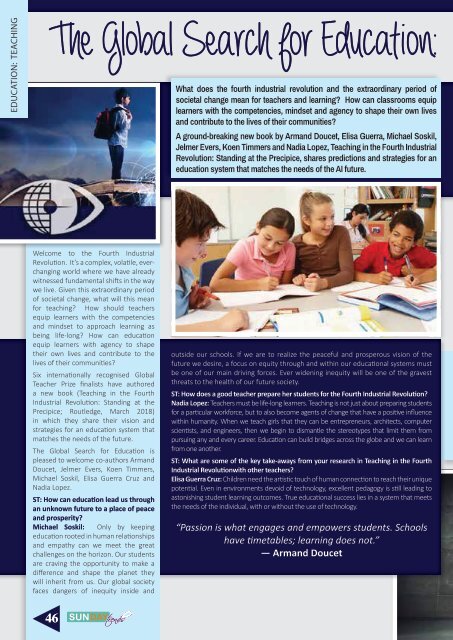You also want an ePaper? Increase the reach of your titles
YUMPU automatically turns print PDFs into web optimized ePapers that Google loves.
EDUCATION: TEACHING<br />
The Global Search for Education:<br />
What does the fourth industrial revolution and the extraordinary period of<br />
societal change mean for teachers and learning? How can classrooms equip<br />
learners with the competencies, mindset and agency to shape their own lives<br />
and contribute to the lives of their communities?<br />
A ground-breaking new book by Armand Doucet, Elisa Guerra, Michael Soskil,<br />
Jelmer Evers, Koen Timmers and Nadia Lopez, Teaching in the Fourth Industrial<br />
Revolution: Standing at the Precipice, shares predictions and strategies for an<br />
education system that matches the needs of the AI future.<br />
Welcome to the Fourth Industrial<br />
Revolution. It’s a complex, volatile, everchanging<br />
world where we have already<br />
witnessed fundamental shifts in the way<br />
we live. Given this extraordinary period<br />
of societal change, what will this mean<br />
for teaching? How should teachers<br />
equip learners with the competencies<br />
and mindset to approach learning as<br />
being life-long? How can education<br />
equip learners with agency to shape<br />
their own lives and contribute to the<br />
lives of their communities?<br />
Six internationally recognised Global<br />
Teacher Prize finalists have authored<br />
a new book (Teaching in the Fourth<br />
Industrial Revolution: Standing at the<br />
Precipice; Routledge, March 2018)<br />
in which they share their vision and<br />
strategies for an education system that<br />
matches the needs of the future.<br />
The Global Search for Education is<br />
pleased to welcome co-authors Armand<br />
Doucet, Jelmer Evers, Koen Timmers,<br />
Michael Soskil, Elisa Guerra Cruz and<br />
Nadia Lopez.<br />
<strong>ST</strong>: How can education lead us through<br />
an unknown future to a place of peace<br />
and prosperity?<br />
Michael Soskil: Only by keeping<br />
education rooted in human relationships<br />
and empathy can we meet the great<br />
challenges on the horizon. Our students<br />
are craving the opportunity to make a<br />
difference and shape the planet they<br />
will inherit from us. Our global society<br />
faces dangers of inequity inside and<br />
outside our schools. If we are to realize the peaceful and prosperous vision of the<br />
future we desire, a focus on equity through and within our educational systems must<br />
be one of our main driving forces. Ever widening inequity will be one of the gravest<br />
threats to the health of our future society.<br />
<strong>ST</strong>: How does a good teacher prepare her students for the Fourth Industrial Revolution?<br />
Nadia Lopez: Teachers must be life-long learners. Teaching is not just about preparing students<br />
for a particular workforce, but to also become agents of change that have a positive influence<br />
within humanity. When we teach girls that they can be entrepreneurs, architects, computer<br />
scientists, and engineers, then we begin to dismantle the stereotypes that limit them from<br />
pursuing any and every career. Education can build bridges across the globe and we can learn<br />
from one another.<br />
<strong>ST</strong>: What are some of the key take-aways from your research in Teaching in the Fourth<br />
Industrial Revolutionwith other teachers?<br />
Elisa Guerra Cruz: Children need the artistic touch of human connection to reach their unique<br />
potential. Even in environments devoid of technology, excellent pedagogy is still leading to<br />
astonishing student learning outcomes. True educational success lies in a system that meets<br />
the needs of the individual, with or without the use of technology.<br />
“Passion is what engages and empowers students. Schools<br />
have timetables; learning does not.”<br />
— Armand Doucet<br />
46

















